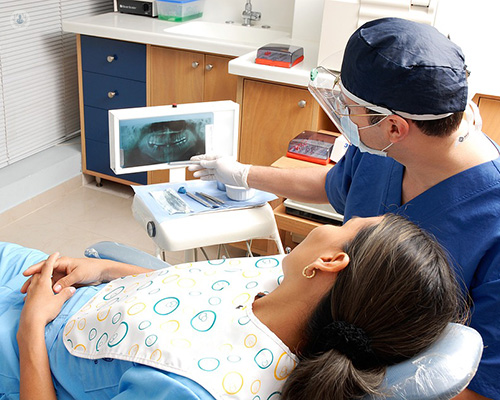Warning signs of impacted wisdom teeth
Autore:The removal of wisdom teeth is one of the most common surgical procedures now performed in the UK. While trhe UK gave up routinely removing wisdom teeth in 1998, problems that wisdom teeth cause and impacted wisdom teeth still affect many around the country. Expert oral and maxillofacial surgeon Mr Luke Cascarini explains when wisdom teeth become problematic, and the solutions that are available.

How early should wisdom teeth be removed? Does everyone need to have them out?
Wisdom teeth should always be assessed by school leaving age by your dentist and should be monitored regularly as part of normal dental care. This is because although completely buried wisdom teeth often do not need any treatment, they can occasionally develop problems such as a cyst on the crown, which if left undetected can become very large and cause serious problems including loosening or loss of teeth and even jaw fracture.
If impacted wisdom teeth are not causing any problems and they are monitored then they can be left where they are. However, as soon as they cause problems such as infection or decay, they should be dealt with. The optimal approach, which requires good clinical judgement, is to try to remove teeth before the neighbouring tooth decays, because although dental decay can be treated and arrested it cannot actually be reversed.
What are the commonest symptoms of an impacted wisdom tooth?
An impacted wisdom tooth is a tooth that has not achieved its normal position. It can be tipped forwards, backwards or sideways or sometimes is angled correctly but there isn't quite enough room for it to meet the opposing tooth - this is called vertical impaction.
Impacted wisdom teeth cause symptoms when the gum around it becomes inflamed or infected. This is called pericoronitis. ‘Peri’ means around, ‘corona’, crown and ‘itis’ means inflammation. When the impacted tooth becomes infected, this is usually acutely painful, hurts when you bite on the area, and often causes a foul taste to develop in the mouth, along with bad breath. This inflammation will sometimes settle down with antibacterial mouthwash or a short course of antibiotics.
It can help to remove the opposing wisdom tooth which is ‘biting’ on the gum around it, but usually once a wisdom tooth has become infected it will be a recurrent problem and the definite solution is for the impacted tooth to be removed. Sadly, some patients do not present until the condition has reached a stage where dental caries (decay) have caused tooth necrosis (death) and abscess formation. This may result in the unnecessary loss of the neighbouring tooth or require extensive dental treatment to try to save it.
What complications can impacted wisdom teeth cause if left untreated?
Untreated impacted wisdom teeth can cause decay in the neighbouring teeth, which can result in either the tooth requiring fillings, or root canal treatment. If left untreated, the impacted tooth can result in gum disease (periodontal disease) behind the lower second molar tooth, which leaves a persistent pocket behind even after the wisdom tooth has been removed.
Impacted wisdom teeth can also lead to cyst formation around their crowns (dentigerous cyst) which can cause bone loss, tooth loss and jaw fracture. There is also some evidence that chronic infection around wisdom teeth can be associated with a systemic rise in inflammatory mediators which have been implicated in heart disease. They can also cause chronic halitosis.
What does the removal of wisdom teeth involve?
Removal of wisdom teeth requires careful assessment of the patient’s health and the situation of the wisdom tooth or teeth. Sometimes this only requires simple dental X-rays, but occasionally more detailed dental CT scanning (cone beam CT) is necessary. This can help, in particular, to assess the relationship between the roots of the tooth and the inferior dental nerve or the floor of the maxillary sinus, for example.
A decision is made, based on all of these factors, on whether it is likely to be beneficial for the tooth to be removed, which involves estimating the risk/benefit ratio of the operation. If a decision is made that the tooth needs to be removed, but the risk of nerve damage is judged to be quite high, then an alternative procedure is to remove the crown of the tooth and leave the root tips behind. This is called a coronectomy (‘corona’ - crown, ‘ectomy’ – removal).
A coronectomy has a slightly higher risk of post-operative pain and infection and sometimes requires a second procedure later on in life to remove the roots: however, it has a much lower risk of nerve damage.
The surgery can be undertaken under local anaesthetic, sedation or a full general anaesthetic. It usually involves cutting the gum and drilling the tooth and the surrounding bone. Modern dental drills, specially designed for cutting tooth and jaw bone, called Piezo, are less traumatic and less likely to damage nerves but are more expensive. After the procedure, the gum is sutured and the patient is given post-operative antibiotics and painkillers.
What is recovery after wisdom tooth removal like?
Recovery depends to some extent on how deeply impacted the teeth are and how many are removed, but it is normal to have quite a lot of post-operative pain and swelling, and an inability to open the mouth wide (trismus). Bruising is also common. Temporary nerve injury rates are quite common (1-2%). Permanent nerve injury rates are much lower. Jaw fractures are extremely rare in experienced hands.
Dry socket, or other types of infections are more common in smokers and people who do not follow the post-operative instructions carefully. Even so, they can occur in up to 5% of people and can be very painful, taking several weeks to resolve and often requiring multiple visits back to the surgeon for socket dressings, prescriptions and monitoring. If the tooth was being removed due to decay in the tooth in front of it, then that tooth will need to be restored by the dentist following surgery.
If you are experiencing problems with your wisdom teeth or are worried that you might need them removed, make an appointment to see a specialist.


